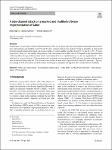Item Infomation
Full metadata record
| DC Field | Value | Language |
|---|---|---|
| dc.contributor.author | Kalle, Ngo | - |
| dc.contributor.author | Elena, Dubrova | - |
| dc.contributor.author | Thomas, Johansson | - |
| dc.date.accessioned | 2023-04-27T04:46:04Z | - |
| dc.date.available | 2023-04-27T04:46:04Z | - |
| dc.date.issued | 2023 | - |
| dc.identifier.uri | https://link.springer.com/article/10.1007/s13389-023-00315-3 | - |
| dc.identifier.uri | https://dlib.phenikaa-uni.edu.vn/handle/PNK/8349 | - |
| dc.description | CC BY | vi |
| dc.description.abstract | In this paper, we show that a software implementation of IND-CCA-secure Saber key encapsulation mechanism protected by first-order masking and shuffling can be broken by deep learning-based power analysis. Using an ensemble of deep neural networks trained at the profiling stage, we can recover the session key and the secret key from 257×N and 24×257×N traces, respectively, where N is the number of repetitions of the same easurement. The value of N depends on the implementation of the algorithm, the type of device under attack, environmental factors, acquisition noise, etc.; in our experiments N=10 is sufficient for a successful attack. The neural networks are trained on a combination of 80% of traces from the profiling device with a known shuffling order and 20% of traces from the device under attack captured for all-0 and all-1 messages. “Spicing” the training set with traces from the device under attack helps us minimize the negative effect of inter-device variability. | vi |
| dc.language.iso | en | vi |
| dc.publisher | Springer | vi |
| dc.subject | software implementation of Saber | vi |
| dc.title | A side-channel attack on a masked and shuffled software implementation of Saber | vi |
| dc.type | Book | vi |
| Appears in Collections | ||
| OER - Công nghệ thông tin | ||
Files in This Item:

